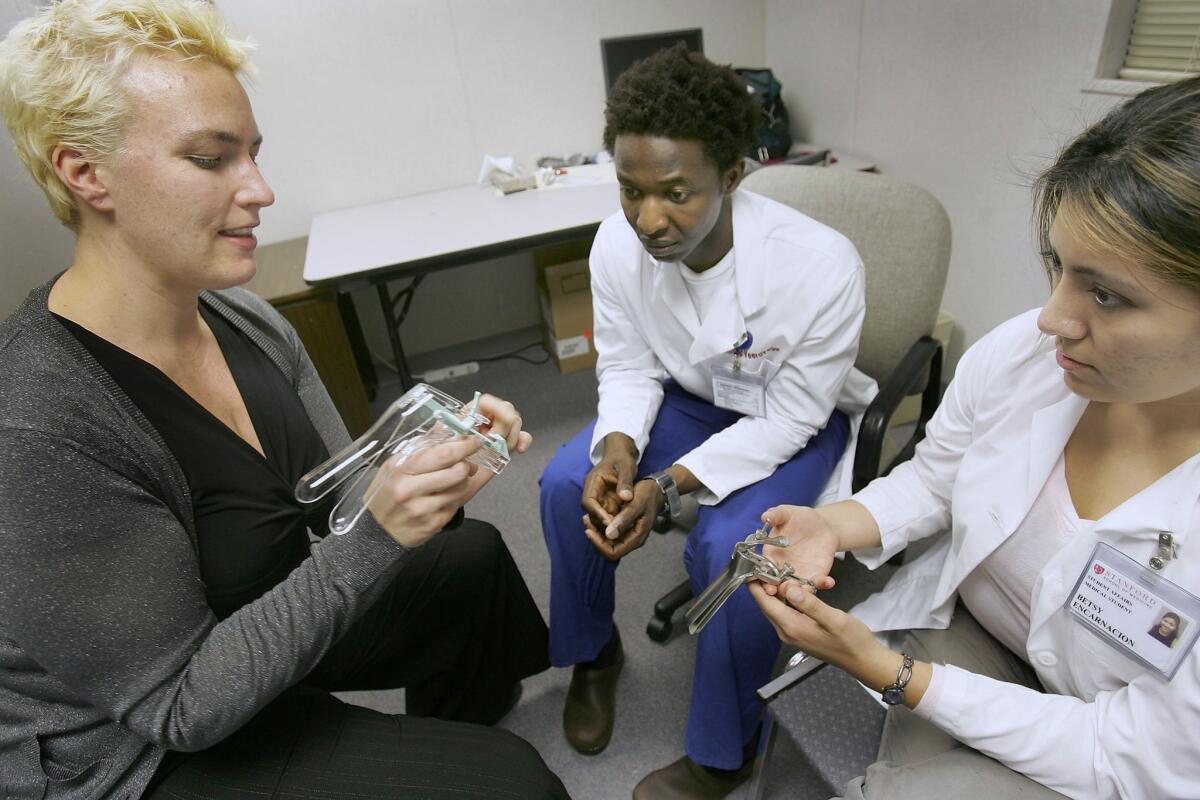Routine pelvic exam should be discontinued, physicians group says

The routine pelvic exam endured by healthy women at their physician’s office is a yearly ritual that frequently produces pain, anxiety and embarrassment in return for no documented benefit, and it should be discontinued, an influential physicians group has concluded.
In a new practice recommendation issued Monday, the American College of Physicians said the visual and manual examination of a woman’s reproductive organs is not an effective way to detect gynecological cancers, venereal or pelvic inflammatory disease or bacterial infections.
But the annual procedure does cause pain and discomfort to as many as 60% of women of childbearing age, prompting many to avoid regular visits to a gynecologist. And it is particularly likely to cause distress to women who have been sexually abused and those who are extremely overweight.
“The pelvic examination has held a prominent place in women’s health for many decades and has come to be more of a ritual than an evidence-based practice,” Dr. George F. Sawaya and Dr. Vanessa Jacoby wrote in an editorial published in the Annals of Internal Medicine alongside the new recommendation.
If gynecologists and obstetricians choose to continue performing the exam on healthy women, they should “clarify its goals and quantify its benefits and harms,” added Sawaya and Jacoby, both OB-GYNs at UC San Francisco.
The national medical bill for the yearly pelvic exam is estimated to reach $2.6 billion. That does not include the costs and risks of follow-up medical visits, laparoscopic procedures and other invasive tests performed after screenings turn up something suspicious.
Whether the recommendation will change the routine medical care of women is uncertain. The advice from the American College of Physicians is aimed mainly at internal medicine specialists and general practitioners. But pelvic exams are most often performed by OB-GYNs who, citing “expert opinion,” have defended their value.
In a committee opinion drafted in 2012 and reaffirmed this year, the American College of Obstetricians and Gynecologists acknowledged that the case for the annual pelvic exam “lacks data to support a specific time frame or frequency.” But the group nevertheless recommended annual pelvic exams for women over 21 without symptoms of possible illness, after a consultation between doctor and patient.
On Monday, the group said it “continues to firmly believe in the clinical value of pelvic exams.”
Dr. Jill Rabin, a gynecologist for 30 years, said “there’s something to the intimacy” built between a woman and the physician who performs her pelvic exam that encourages the sharing of symptoms that could ensure early recognition of disease.
Out of a mixture of “fear and embarrassment,” many women won’t volunteer to their internist their struggles with pain during sex, incontinence, abdominal bloating or spotting, said Rabin, head of urogynecology at the Long Island Jewish Medical Center in New Hyde Park, N.Y. The pelvic exam can detect some of those, and “the trust we build with patients” encourages women to report them as well, she added.
The new guidelines come about two years after a federal task force recommended longer intervals between cervical cancer screenings — a traditional reason for women’s yearly visits to a gynecologist — for most healthy women between 21 and 65. In March 2012, the U.S. Preventive Services Task Force said that a Pap smear need only be performed every three years to detect precancerous lesions or the earliest signs of cervical cancer.
As women sense less urgency in their yearly “well woman” visits, some physicians fretted that patients may wait too long.
“Human nature being what it is, I’m quite concerned that women who would routinely go for screening will say, ‘Oh, I’ll go next year,’” said Dr. Robert Morgan, an oncologist at City of Hope in Duarte. “I’m terribly afraid we’ll see an increased incidence of cervical cancer.”
For women who have been buffeted by the back-and-forth debate over breast cancer and cervical cancer screenings, the new recommendations are likely to deepen confusion.
“It’s just yet another thing on the list, isn’t it?” said Sawaya of UC San Francisco. But while other reversals on screening have been based on new medical research, “what’s different about this one is that they’re acknowledging that there really never was any evidence of benefit” to support the pelvic exam.
Faced with a difference of professional opinion on the value of pelvic exams, it’s more important than ever for women to talk with their physicians about their overall health and to recognize that patients can’t always tell when a physical complaint is a warning sign, said Dr. Daniela Carusi, a gynecologist at Brigham & Women’s Hospital in Boston.
For patients who want to skip the test, “I tell them that if they’re truly asymptomatic, we don’t know of any major health benefit of the pelvic exam,” she said. But “a lot of women don’t address their symptoms until they come in for that exam.” For those women, the prospect of a pelvic exam may be an important prod to health, she added.
Twitter: @LATMelissaHealy







